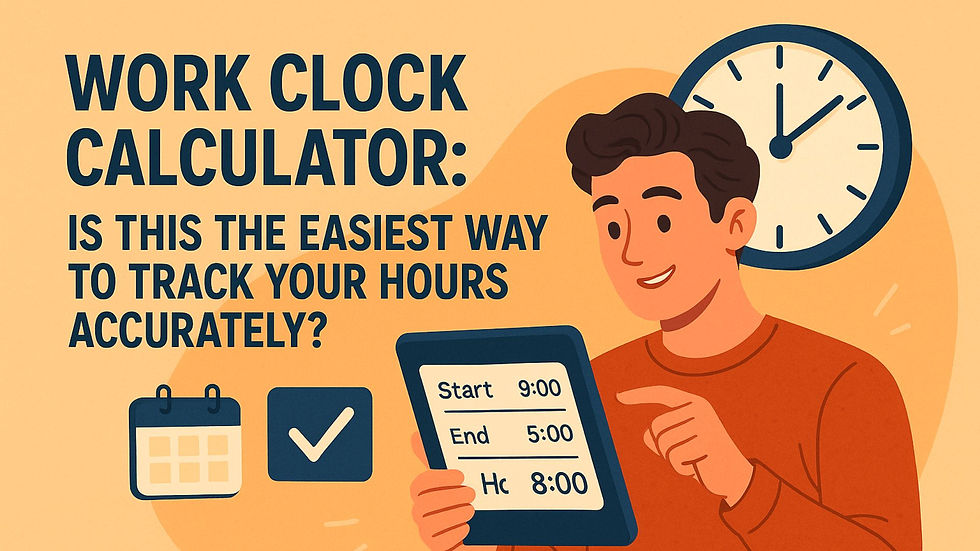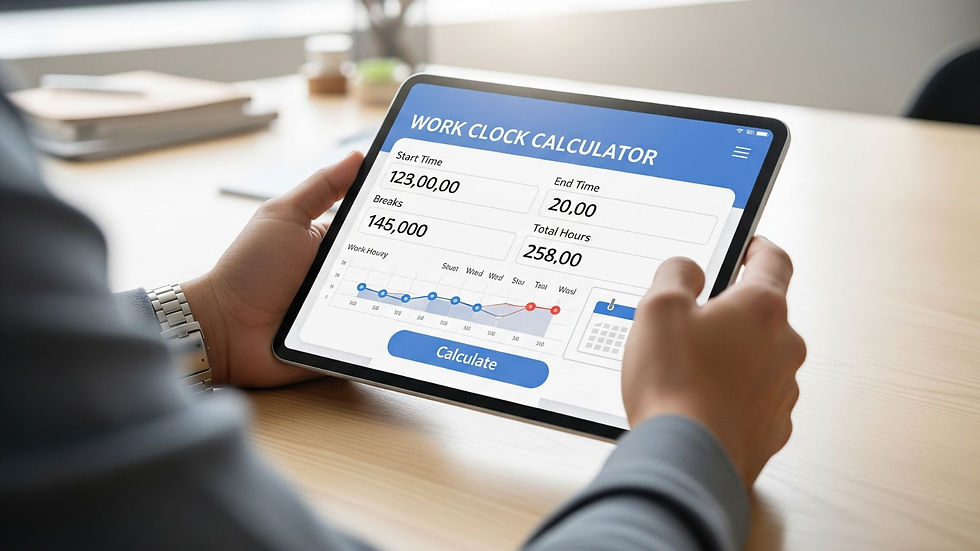Work Clock Calculator: Is This The Easiest Way To Track Your Hours Accurately?
- silvalea884
- Aug 11, 2025
- 4 min read

Have you ever finished your week wondering if your hours were recorded correctly? For employees, freelancers, and business owners alike, keeping track of work time is not just about organization, it’s about fair pay, accurate billing, and better productivity. That’s where a work clock calculator comes in. But what exactly is it, and how can it make tracking your hours simpler than ever?
In this article, you’ll discover exactly how it works, why it matters, and how to get the most out of it, all in plain, easy-to-understand language.
What Is a Work Clock Calculator?
It is a simple yet powerful tool designed to track the time you spend on the job. It records when you start, when you stop, and calculates total hours worked sometimes down to the minute. This ensures:
Accurate payroll calculations for hourly workers
Reliable time logs for projects and billing
Transparency between employers and employees
In essence, it eliminates the guesswork. Instead of mentally adding up hours or relying on rough estimates, you have a precise record that can be reviewed and verified anytime.
Why Accurate Time Tracking Matters
Precise time tracking is more than just an administrative habit ,it directly affects your income, business costs, and even your legal compliance.
Here’s why it matters:
Fair Compensation- When hours are tracked correctly, employees get paid exactly what they’ve earned without disputes.
Compliance with Labor Laws – In many regions, labor laws require accurate work hour log for audits or disputes.
Project Planning – For businesses, knowing how long tasks take helps in setting realistic deadlines.
Better Productivity Insights – Detailed tracking can show where time is being lost and how processes can be improved.
How to Use a Work Clock Calculator Effectively

Getting the most from a work clock calculator isn’t just about recording start and stop times — it’s about consistent habits.
Here are simple steps for effective use:
Log Hours Immediately – Record your start and end times as they happen to avoid forgetting details later.
Track Breaks Separately – This ensures you only count actual work time.
Review Weekly – Regularly checking logs can help identify inconsistencies early.
Use Clear Naming – If you work on multiple tasks or projects, label them clearly for better reporting.
Common Mistakes to Avoid When Tracking Hours
Even with the right tool, errors can still happen. Avoid these common pitfalls:
Rounding Too Much – While rounding might seem easier, it can lead to underpayment or overpayment over time.
Forgetting Breaks – Overlooking unpaid breaks can throw off totals.
Inconsistent Logging – Skipping entries creates gaps that are hard to fill later.
Being disciplined with your entries ensures your work clock calculator always produces trustworthy results.
Benefits for Both Employers and Employees

The appeal of a work clock calculator lies in its mutual benefits.
For Employers:
Streamlined payroll process
Fewer disputes over hours
Data for performance reviews
For Employees:
Proof of hours worked
Accurate overtime calculation
Greater trust in payroll accuracy
This two-way value makes it a vital time management solution for all industries.
Work Clock Calculator in Action
Imagine you’re a freelancer juggling multiple clients. Team projects requires accurate billing based on hours worked. By starting your day with a quick time log and stopping it after each task, you create a detailed breakdown for your invoice without second-guessing the total.
For a business, the same principle applies: employees clock in and out daily, ensuring payroll runs smoothly at the end of each pay period. The system doesn’t just save time , it builds trust.
Choosing the Right Solution
While there are many ways to track hours, the best choice for you depends on:
Industry needs – Some businesses require advanced reporting features.
Work environment – Remote teams may need cloud-based solutions, while on-site teams may use hardware-based systems.
Budget – Options range from free to enterprise-level tools.
Look for something that’s easy to use, accessible on the go, and reliable under all working conditions.
You can also watch:- How To Check Production of Employee Location Wise With EmpMonitor?
Final Thoughts
Accurate time tracking isn’t just about numbers , it’s about fairness, efficiency, and trust. A work clock calculator removes uncertainty, giving both employers and employees the confidence that every minute is accounted for. Whether you’re a solo entrepreneur or managing a large workforce, adopting this approach can transform the way you handle work hours.
Quick FAQ
1. Can I use a work clock calculator for multiple jobs? Yes, as long as you label each entry clearly, it can track hours for different roles or projects.
2. How accurate is it? When used consistently, it can track time down to the minute, ensuring precise calculations.
3. Does it work for remote teams? Absolutely. Many solutions are cloud-based, making them ideal for distributed teams.
4.Can it help with overtime calculations? Yes. By logging your daily hours, it can easily flag when you exceed standard work limits, making overtime tracking simple.
5. Is it suitable for freelancers? Definitely. Freelancers can use it to track billable hours for each client, ensuring accurate invoices and transparent reporting.

Comments